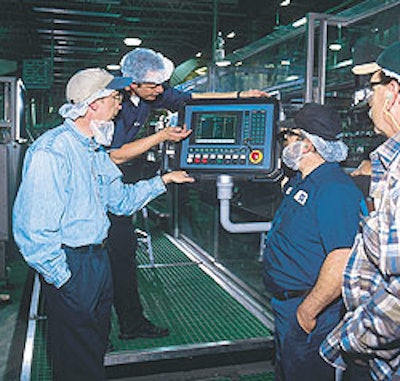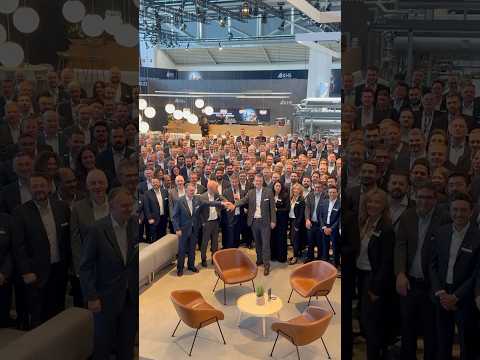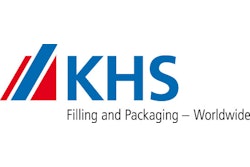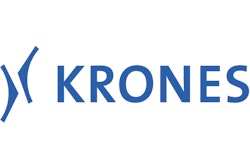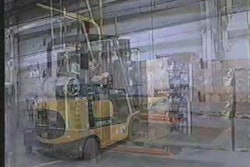Ongoing vendor-supplied training and machine audits are critical to training mechanics at the Poland Spring Bottling Co. in Poland Spring, ME. Audits, typically conducted twice a year by three key vendors, help keep machinery operating efficiently.
Efficient machine operation at the plant is no surprise, given that these audit reports pull no punches. For example, the maker of a palletizer performed a visual inspection of its equipment at the plant resulting in these specific assessments and recommendations:
• “The case turner is covered by product stickers. Some are flapping. These could easily cause incorrect readings by the photoeyes. The stickers should be removed to assure proper function.”
• “The belting is fraying on the decline belt and should be watched closely for further deterioration.”
• “The pallet dispenser tabletop is warped so that pallets do not seat correctly. This causes occasional misfeeds due to not correctly meshing with the fingers. The back-side fingers try to pick up two pallets, and the near-side fingers try to pick up one. Recommendation is to repair the table top.”
• “The chains are extremely dirty. This will contribute to premature failure of the components. They need to be thoroughly cleaned.”
Supplier audit reports such as this are instrumental to the learning process for Poland Spring mechanics. Vendor training at the plant is separate from the company’s “on-the-job” (OJT) packaging curriculum, developed in-house for operators. (For more specifics on the OJT training program, and how Poland Spring justifies it economically, see story, p. 75).
Poland Spring’s vendor training for mechanics involves personnel from makers of blow-molding machines and all types of packaging machinery used at the facility.
“We rely heavily on our equipment manufacturers to help train us on how to start, stop, changeover, adjust, troubleshoot, and do preventive maintenance on their machines,” says training manager Val Lovelace, who in 1999 was put in charge of training and development at the plant.
Manufacturer responsibilities
The company decided to involve suppliers to train plant mechanics. “I think that [packaged goods] manufacturers [like us] tend to first go to vendors to service parts that are broken rather than for prevention needs,” Lovelace says. Vendors tell her that when some manufacturers purchase equipment, they just want to get the machinery up and running as quickly as possible, with little if any supplier intervention. She sees that as a mistake, recommending that manufacturers work with vendors, and vice versa.
“I think if vendors could be a little more proactive when it comes to their services for training and preventive maintenance procedures and programs, customers like us would be a lot happier,” Lovelace contends. “We’d end up buying a machine that we’d be better prepared to maintain.”
Maintaining equipment is especially important to Poland Spring. To help it determine what repairs are necessary, the bottler relies in part on audits such as those described above from palletizer vendor Alvey Systems (St. Louis, MO). Alvey is part of Poland Spring’s inner circle of vital training vendors that include Krones (Franklin, WI), makers of labelers and fillers, and Kisters Kayat (Edgewater, FL), suppliers of overwrapping and shrink-tunnel machinery. “They have and continue to be top-notch,” she notes. “They send people to our plant at least twice a year, and they provide important machine audits for us.”
A June audit report from Alvey provides insight as to the importance of these audits. The 57-page spiral-bound report lists the name of the vendor’s equipment and its line number at Poland Spring in a table of contents. Chapters are provided for each palletizer; they begin with a general assessment on the state and cleanliness of the machine.
Next come specific assessments and recommendations where machine components are inspected, with detailed recommendations given for each component. Color photography shows close-up views of parts, with their numbers, showing concern areas. Arrows are often used to point to a specific part. Above these pictures are part numbers, descriptions, unit price, and total price for the parts necessary to maintain the equipment. The report concludes with an overall list of recommended parts, options, and total pricing for parts and installation.
On-site training
Shortly after taking charge of the plant’s training program, Lovelace says, “we conducted a needs assessment plan on the equipment. For instance, not a lot of people here were familiar with the overwrapping equipment we use for producing six-, eight-, and 12-packs of our bottles,” she explains. “Kisters answered our call by sending operation and maintenance help.”
Poland Spring’s production manager praises Kisters Kayat’s Christian Schlichtenbrede for leading the way. “He comes from Germany and provides us with three days of in-depth mechanic training twice a year. The first year he was here three times. When he arrives, he inspects the controls, makes machine adjustments, checks for alignment, cleanliness, makes sure we’re using the correct amount of lubricants, and so forth. That inspection helps him prepare for three days of classes where he can talk about our machines specifically. If there’s any question we have on the equipment, Chris can answer it. He is ‘Mr. Kisters’ to us,” she states.
Before 1999, Poland Spring hadn’t conducted machine auditing. Kisters Kayat, Krones, and Alvey all provide this critical service. “Alvey probably does the most comprehensive machine audit, in that we receive a formal report back from them,” Lovelace says. “Kisters Kayat and Krones provide a similar service; all three vendors are absolutely key to the success of mechanic training.”
What does this all cost Poland Spring/Perrier Group of America? The company says a better question might be, “What would it cost not to train machine operators and mechanics?”
“We have a substantial training budget based on our bottom line,” Lovelace says. “We would rather invest in our employees up front rather than try to play catch-up later on with people who then have to learn how to operate their machinery.
“Involving the vendors is essential to our success,” she summarizes, “with vendor audits and mechanic training serving as the backbone to our training program. It’s far easier to train others how to operate a machine, if the machine is taken care of by a skilled mechanic. And who better to train mechanics on the equipment than the vendors who make that equipment.”
